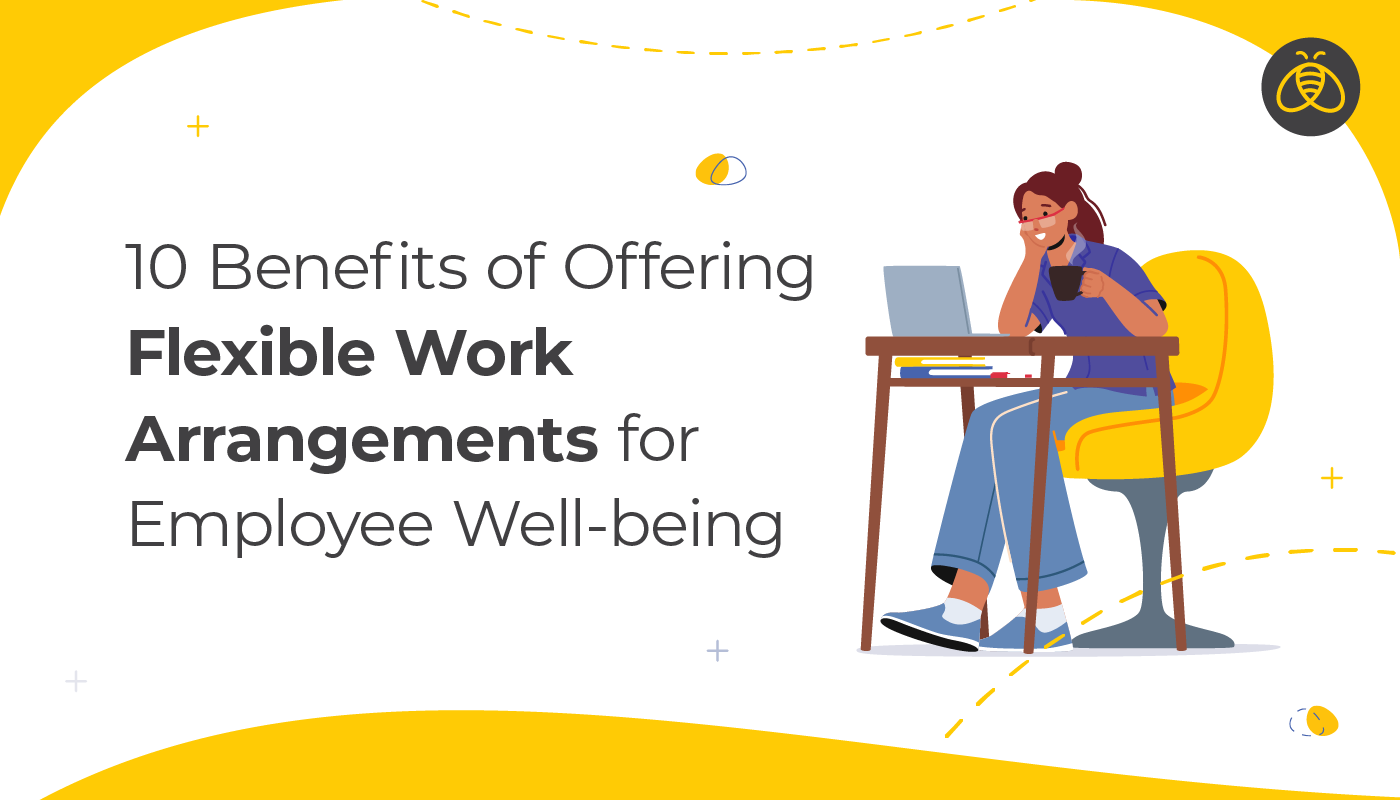10 Benefits of offering flexible work arrangements for employee well-being
By: Benefits by Design | Tuesday August 6, 2024
Updated : Friday May 9, 2025
The concept of traditional 9-to-5 office hours is becoming increasingly outdated. More companies are recognizing the importance of flexible work arrangements, not only for boosting productivity but also for enhancing employee well-being. Businesses can foster a more motivated and healthier workforce by allowing employees to control their schedules and work locations. This blog post will explore the numerous benefits of flexible work arrangements and how they contribute to employee satisfaction and well-being.
Cultivating excellence: strategies for companies to elevate employee performance
1. Enhanced work-life balance
One of the most substantial benefits of flexible work arrangements is enhancing work-life balance. Employees can tailor their work schedules to fit their personal lives, reducing the stress and strain of juggling professional and personal responsibilities. This balance leads to a more harmonious lifestyle, allowing employees to manage family obligations, pursue hobbies, and maintain a healthy personal life without compromising their professional commitments.
2. Increased productivity and efficiency
Flexible work arrangements often result in increased productivity and efficiency. When employees have the autonomy to choose their work hours and environments, they can work during their most productive times of the day. This flexibility reduces burnout and leads to higher-quality work, as employees are more focused and motivated. Additionally, reducing commuting time allows employees to allocate more time to their tasks, further enhancing productivity.
3. Attraction and retention of top talent
In a competitive job market, flexible work can be a key differentiator in attracting and retaining top talent. Employees increasingly value flexibility in their work schedules, and companies that provide this benefit are more likely to stand out to potential hires. Additionally, current employees are more likely to stay with a company that supports their need for work-life balance, reducing turnover rates and the costs associated with recruiting and training new staff.
Evolving Your Employee Benefits Strategy to Attract Top Talent and Help with Employee Retention
4. Reduced commuting stress
Commuting can be a significant source of stress for many employees. Long hours in traffic or crowded public transportation can lead to fatigue and decreased job satisfaction. Companies can alleviate this stress by offering flexible work arrangements, allowing employees to work from home or choose non-peak hours for commuting. This change improves mental well-being and contributes to a more sustainable environment by reducing traffic congestion and emissions.
5. Improved mental health and well-being
Flexible work arrangements positively impact employees’ mental health and overall well-being. Working in a comfortable and supportive environment, whether at home or in a location of their choice, can significantly reduce stress and anxiety. Employees can take breaks when needed, manage their workloads more effectively, and avoid the negative effects of a rigid and stressful work environment. This improvement in mental health leads to increased job satisfaction and overall happiness.

6. Better physical health
Alongside mental health benefits, these work arrangements can improve physical health. Employees who work from home or have flexible hours can incorporate physical activity into their daily routines more easily. They can take regular breaks, stretch, exercise, and maintain a healthier lifestyle. This focus on physical health can lead to fewer sick days and a more energetic and engaged workforce. This way, you will build a strong team with a will for work and growth.
7. Enhanced creativity and innovation
Flexible work arrangements can foster a culture of creativity and innovation within a company. Employees can find inspiration in different settings when choosing their work environments. This variety can stimulate creative thinking and lead to innovative solutions and ideas. Moreover, employees who feel trusted and valued are more likely to contribute to the company’s growth and success with fresh perspectives and creative problem-solving skills.
8. Increased job satisfaction and employee loyalty
In today’s dynamic work environment, flexible work arrangements are essential for boosting employee well-being and productivity. That might include relocating your office to a more central location in Toronto, for example, or moving to more flexible and efficient office spaces to better support employees’ evolving needs. Fortunately, companies can guarantee a smooth transition by choosing to team up with commercial movers in Toronto. These movers provide expertise that significantly simplifies the logistical challenges, allowing your business to transition smoothly without disrupting work processes.
9. Seamless collaboration during relocations
In today’s dynamic work environment, flexible work arrangements are essential for boosting employee well-being and productivity. That might include relocating your employees or even your office to a more central location for all staff. Or relocating to more flexible and efficient office spaces to better support employees’ evolving needs. It can help businesses navigate this transition smoothly. By partnering with experienced movers, companies can ensure a seamless adaptation and efficient relocation process.
10. Cost savings for employees and employers
Flexible work arrangements can lead to significant cost savings for employees and employers. For employees, the ability to work from home reduces expenses related to commuting, such as gas, public transportation, and vehicle maintenance. Additionally, there are savings on daily work-related costs like meals, coffee, and professional attire. For employers, flexible work options can reduce the need for large office spaces, lower utility bills, and decrease overhead costs associated with maintaining a physical office. These savings can then be reinvested into the company or used to provide additional employee benefits, creating a win-win situation for everyone involved.
The value of flexible work arrangements
The advantages of providing flexible work arrangements extend well beyond mere convenience. They enhance employee well-being, boost productivity, and foster a positive work culture. Companies can create a more motivated, healthier, and loyal workforce by allowing employees to control their work schedules and locations. These work arrangements are a perk and a strategic advantage for businesses looking to stand out in a competitive market. Embracing this approach improves the quality of work and demonstrates a genuine commitment to employee happiness and satisfaction.


